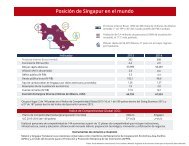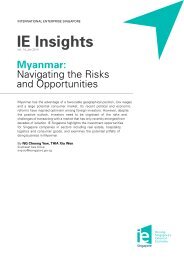basic-guide-to-exporting_Latest_eg_main_086196
basic-guide-to-exporting_Latest_eg_main_086196
basic-guide-to-exporting_Latest_eg_main_086196
You also want an ePaper? Increase the reach of your titles
YUMPU automatically turns print PDFs into web optimized ePapers that Google loves.
Exceptions <strong>to</strong> the use of the destination control statement are listed in Part 758.6of the EAR. Advice on the appropriate statement <strong>to</strong> use can be provided by the U.S.Department of Commerce, an at<strong>to</strong>rney, or the freight forwarder.Antiboycott R<strong>eg</strong>ulationsThe United States has an established policy of opposing restrictive trade practices orboycotts fostered or imposed by foreign countries against other countries friendly<strong>to</strong> the United States. This policy is implemented through the antiboycott provisionsof the Export Administration Act (enforced by the U.S. Department of Commerce)and through a 1977 amendment <strong>to</strong> the Tax Reform Act of 1976 (enforced by theU.S. Department of the Treasury). In general, these laws prohibit U.S. persons fromparticipating in foreign boycotts or taking actions that further or support suchboycotts. The antiboycott r<strong>eg</strong>ulations carry out this general purpose by:• Prohibiting U.S. agencies or persons from refusing <strong>to</strong> do business withblacklisted companies and boycotted friendly countries pursuant <strong>to</strong> foreignboycott demands• Prohibiting U.S. persons from discriminating against, or agreeing <strong>to</strong> discriminateagainst, other U.S. persons on the basis of race, religion, gender, or nationalorigin in order <strong>to</strong> comply with a foreign boycott• Prohibiting U.S. citizens from furnishing information about business relationshipswith boycotted friendly foreign countries or blacklisted companies in response <strong>to</strong>boycott requirements• Providing for public disclosure of requests <strong>to</strong> comply with foreign boycotts• Requiring U.S. persons who receive requests <strong>to</strong> comply with foreign boycotts<strong>to</strong> report receipt of the requests <strong>to</strong> the U.S. Department of Commerce and <strong>to</strong>disclose publicly whether they have complied with such requestsForeign Corrupt Practices ActUnder the Foreign Corrupt Practices Act (FCPA), it is unlawful for a U.S. person orcompany (as well as any officer, direc<strong>to</strong>r, employee, or agent of a company or anys<strong>to</strong>ckholder acting on behalf of the company) <strong>to</strong> offer, pay, or promise <strong>to</strong> pay moneyor anything of value <strong>to</strong> any foreign official (or foreign political party or candidatefor foreign political office) for the purpose of obtaining or retaining business;authorization of any such payment or promise is prohibited, as well. It is also unlawful<strong>to</strong> make a payment <strong>to</strong> any person while knowing that all or a portion of the paymentwill be offered, given, or promised—directly or indirectly—<strong>to</strong> any foreign official(or foreign political party or candidate for foreign political office) for the purposesof assisting the company in obtaining or retaining business. “Knowing” includes theconcepts of conscious disr<strong>eg</strong>ard and willful blindness. The FCPA also covers foreignpersons or companies that commit acts in furtherance of such bribery in the terri<strong>to</strong>ryof the United States. U.S. persons or companies, or covered foreign persons orcompanies, should consult an at<strong>to</strong>rney when confronted with FCPA issues.108U.S. Commercial Service • A Basic Guide <strong>to</strong> Exporting





